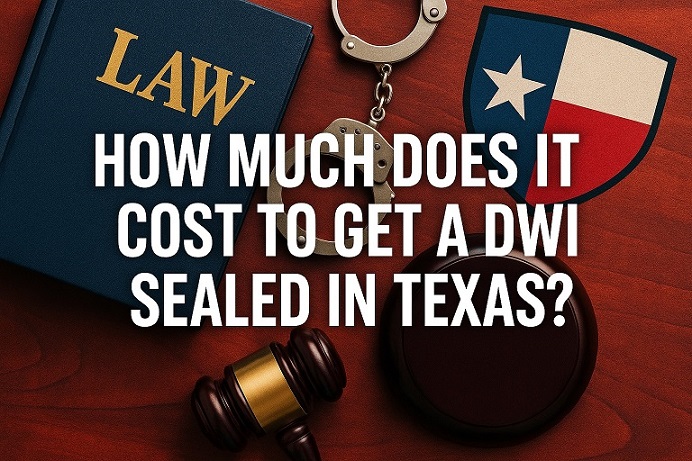A DWI on your record can follow you for years in Texas. It can show up on background checks for jobs, housing, and even professional licenses. Thankfully, state law allows certain individuals to request that their DWI be “sealed” through an Order of Nondisclosure.
Sealing your record doesn’t erase it completely, but it hides the conviction from most employers, landlords, and public searches. This process offers a second chance—but it also comes with specific eligibility requirements and costs that you should know before starting.
Highlights
What Does It Mean to Seal a DWI in Texas?
Sealing a DWI in Texas means your conviction is hidden from public record, so most employers, landlords, and background check services cannot see it. This protection is granted through what’s called an Order of Nondisclosure.
 It’s important to note that sealing is not the same as an expungement. Expungement erases a record completely, as if the arrest or conviction never happened. Sealing, on the other hand, keeps the record out of public view but still allows certain agencies to access it. Law enforcement, courts, and some licensing boards can still see your DWI, even if it’s sealed.
It’s important to note that sealing is not the same as an expungement. Expungement erases a record completely, as if the arrest or conviction never happened. Sealing, on the other hand, keeps the record out of public view but still allows certain agencies to access it. Law enforcement, courts, and some licensing boards can still see your DWI, even if it’s sealed.
Not every DWI qualifies. Texas law limits this option to first-time DWI convictions where no serious injuries or fatalities occurred and where your blood alcohol concentration (BAC) was below a certain level. If you meet these requirements, sealing your record can make a significant difference in how your past affects your future opportunities.
Legal Considerations Before Sealing a DWI in TX
Before moving forward with sealing a DWI, it’s important to understand the legal rules and restrictions set by Texas law. Not every case qualifies, and filing when you’re not eligible can waste both time and money.
Under Texas Government Code Chapter 411, you may petition for an Order of Nondisclosure only if:
-
The DWI was your first offense.
-
The case did not involve an accident with another person (injury or serious property damage).
-
You successfully completed all terms of your sentence, probation, or deferred adjudication.
-
You have no additional criminal convictions after the DWI.
-
You’ve waited the required period, which is generally 2 years with an ignition interlock device or 5 years without one.
Even if you meet all these requirements, the judge still has discretion. The court will consider whether granting nondisclosure serves the best interest of both you and the public.
Hiring a lawyer is strongly recommended here. A legal professional can confirm your eligibility, prepare the petition correctly, and represent you if the prosecutor challenges your request.
Key Costs of Sealing a DWI in Texas
The cost of sealing a DWI in Texas varies by county, court, and attorney, but most people should expect to spend between $1,300 and $3,000 in total. These costs are broken down into several parts:
-
Court Filing Fees
Every petition requires a filing fee, usually between $300 and $400, paid directly to the district clerk’s office. The exact amount depends on the county where your case was handled. -
Attorney Fees
While you are allowed to file on your own, most people hire a lawyer to avoid mistakes. Attorney fees typically range from $1,000 to $2,500, depending on the lawyer’s experience and the complexity of the case. -
Notary and Document Fees
Notarization is required to make your petition official. These fees are usually small—about $20 to $50. -
Certified Copies
If you want certified copies of the court’s final order, you may need to pay about $1–$5 per page. These copies are useful for your records and proof of sealing.
Total cost range: Most Texans will spend around $1,300 on the low end to $3,000 on the high end. The majority of this cost comes from attorney fees, which often pay off by ensuring the process is handled correctly the first time.
Timeline and Process for Texas DWI Sealing
The process of sealing a DWI in Texas isn’t instant—it requires several steps and can take anywhere from 2 to 6 months, depending on the county and the court’s schedule. Here’s a general outline of what to expect:
-
Consult a Lawyer
The first step is to meet with an attorney who can review your case history, confirm your eligibility, and collect the documents needed for your petition. -
Prepare and File the Petition
Your lawyer will draft the petition for nondisclosure and submit it to the same court where your DWI was originally handled. At this point, you’ll pay the filing fee. -
Court Review
Once filed, the petition goes before a judge. In some cases, the prosecutor may be allowed to review and respond to your request. -
Hearing (if required)
Some courts hold a formal hearing where you (or your lawyer) must appear to explain why your DWI should be sealed. Not all petitions require a hearing, but if they do, this step can add several weeks to the process. -
Judge’s Decision
If the judge approves your request, an Order of Nondisclosure will be issued. This order directs state agencies to seal your record from public view. -
Record Update
After the order is granted, state agencies and background check systems update their records. This may take additional time, but once processed, your DWI will no longer appear on most background checks.
On average, the process is completed in about 3 to 4 months, but busy court systems may take longer.
When and Where to File for a DWI Seal in Texas
If you qualify to seal your DWI, you must file your petition in the same court that handled your original case. This is usually the county or district court where your conviction or probation was entered.
Where to file:
-
County District Clerk’s Office – Most petitions go through the district clerk in the county where your DWI was handled.
-
Online Filing – Many Texas counties now require electronic filing (e-filing), which your lawyer can handle on your behalf.
-
In-Person Submission – Some counties still allow physical filing at the courthouse clerk’s office.
Examples by location:
-
If your case was in Dallas County, you would file with the Dallas County District Clerk.
-
If it was in Harris County (Houston), you would file with the Harris County Clerk of Court.
-
In Travis County (Austin), the petition goes through the Travis County District Clerk’s Office.
Tips for filing:
-
Always confirm the correct office and filing method before submitting.
-
Make at least two copies of your petition and keep one notarized copy for your records.
-
Follow up with the clerk’s office or your lawyer to ensure the filing is accepted and placed on the court’s docket.
Since rules vary slightly between counties, having a lawyer manage the filing helps ensure your petition is submitted to the right place, in the right format, and on time.
FAQs about Sealing a DWI in Texas
How long do I have to wait to seal a DWI in Texas?
Most people must wait 2 years if they had an ignition interlock device or 5 years if they did not. The waiting period ensures you’ve demonstrated a clean record before asking the court for relief. Each case is different, so the judge will still review your full history before making a decision.
Does sealing a DWI remove it completely?
No. Sealing hides the record from public view but does not erase it. Law enforcement, courts, and certain licensing agencies in Texas will still see the DWI if required. This means sealing improves privacy but is not the same as expungement.
Can a second DWI be sealed in Texas?
Generally no—only first-time DWI convictions qualify. If you have more than one DWI on your record, you are not eligible for nondisclosure. Repeat offenses are treated more seriously under Texas law, which makes sealing unavailable.
Is a lawyer required to seal a DWI in TX?
A lawyer isn’t legally required, but it’s strongly recommended. The process is technical, and errors in filing can delay your case or result in denial. Having a lawyer also ensures you meet all eligibility criteria before paying court fees.
Does sealing affect my driving record in Texas?
No. Your driving history with the Texas Department of Public Safety (DPS) remains separate. A sealed DWI won’t appear on most background checks, but your DPS driving record may still show license suspensions or points. Insurance companies may also continue to see your driving record.
How much do lawyers typically charge in TX?
Most attorneys charge between $1,000 and $2,500 to handle a nondisclosure petition. Fees vary depending on experience, location, and whether a hearing is required. Some attorneys may offer flat fees while others charge hourly.
What happens if the judge denies my petition?
If your petition is denied, you may be barred from re-filing for a period of time. Consulting a lawyer before filing helps avoid mistakes that could lead to rejection. In some cases, your lawyer may be able to appeal or refile after correcting errors.
Can employers still see my DWI after it’s sealed?
Most private employers cannot. However, government jobs, law enforcement, and certain regulated industries in Texas may still access sealed records. This means sealing is very helpful for most employment but may not protect you in sensitive positions.
Ready to seal your DWI in Texas and move forward with a clean slate?
The process can feel confusing, but you don’t have to go through it alone. A Texas lawyer experienced in DWI nondisclosure can confirm your eligibility, prepare your petition correctly, and represent you in court if needed. With the right legal support, you can avoid costly mistakes and improve your chances of success.
Don’t let an old DWI hold you back from jobs, housing, or opportunities. If you’re considering filing for an order of nondisclosure, reach out to a qualified Texas lawyer today or contact a local legal aid office to get started on the path toward protecting your record.



